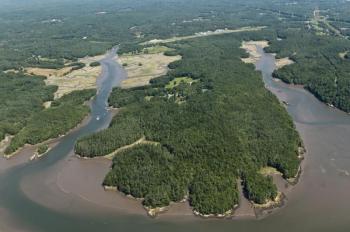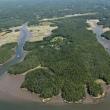Chewonki Foundation limits access to its Chewonki Neck land
From now on, anyone who wants to get onto Chewonki Foundation’s 400 acres on Chewonki Neck will need written permission. And, for now, the nonprofit is completely barring marine harvesters from using its land on the neck to get to nearby public mudflats.
The foundation announced the changes in a press release Sept. 3. Open access for the public was set to end at 6 p.m., Sept. 3.
The nonprofit will be taking time to consider how it might reopen its land access to local marine harvesters, but, for now, no written permission will be granted for marine harvesting, spokesman Deb Cook said in a telephone interview and emails to the Wiscasset Newspaper.
Chewonki Foundation President Willard Morgan states in the release: “We are considering granting access on a limited basis, and with a registration requirement, to the local marine harvesters at some future date.”
Whether local harvesters would mean Wiscasset residents only, or other parameters, is part of what will be looked at, according to Cook.
She had no time-frame for how long the foundation may take to consider its options for the harvesters.
“We want to give it the good thought,” she said.
In the meantime, the foundation recommends diggers call the town office at 207-882-8200, for information on public launches and access points to the mudflats.
The Wiscasset waterfront and Ferry Road Landing both have public access, Town Manager Marian Anderson said.
A launch on Westport Island, opposite Ferry Road Landing, is open to the public, said Jon Hentz, Wiscasset’s municipal shellfish conservation warden.
Clam diggers already get to the flats by boat, since their product is so heavy, Hentz said.
Most of the marine harvesters dig for bloodworms, Cook said. It was not immediately known how many had been using the foundation’s land to get to the flats.
Margaret Harrington figures it to be as many as 100, possibly more, over a one-year span; she manages Phil Harrington Bait, a Woolwich business that buys worms dug around the state and then sells them wholesale, worldwide. In a telephone interview September 4, Harrington said she supports the foundation’s decision to block all diggers’ access to its land while considering next steps; but she said she would not support letting only Wiscasset diggers in. The standard should be a background check or some other form of screening, not where someone lives, she said.
The foundation ended open access to its Chewonki Neck property after speaking with Wiscasset police and town officials.
“As a school, we are aware that times have changed and that we need to adapt to that change,” Morgan states in the release. “In recent discussions with Wiscasset Police Chief Troy Cline, we have been advised to carefully assess and update our campus access policy. We understand that some of the challenges that we might think of as ‘big city’ challenges are now present in our small town community.
“At Chewonki, we are responsible for creating a safe and healthy environment for our students. To this end, we have concluded that we must restrict access only to staff, program participants and invited guests.”
The release does not further define those challenges it says are now in the community. Cook did not cite a problem with anyone’s use of the property.
A break-in occurred at the foundation’s development office in mid-August, Wiscasset Police Sgt. Kathy Williams said. Someone entered through a window and took an electronic device, Williams said. No one has been charged.
Limiting access to property that serves as a school is a good decision, according to Williams.
“You should know who’s on your land.”
The department will help in any way it can with the change to the new restrictions, she said.
Other foundation properties, including Eaton Farm and acreage on Cushman Mountain, remain open to the public, Cook said.
Event Date
Address
United States

























